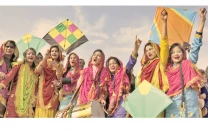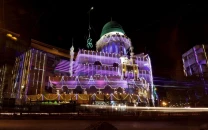In a tent, a new life is given

In a tent, a new life is given
It is actually a ward of the Surgical Hospital for Weapon Wounded run by the International Committee of the Red Cross (ICRC). Established in 2009, the Peshawar hospital treats many suffering from the fallout of the war on terror.
The first thing one notices upon entering Titanic is that, unlike many hospitals, it smells clean.
On a bed close to the tent’s entrance lies a child with an amputated leg.
The child says that his name is Suliman and that he is from Bajaur Agency. He is sitting up in bed and looking at his bandaged knee beneath which his right leg is missing. On another bed close to him is a middle-aged man who introduces himself as Mohammad Idress, the child’s father.
A bright-eyed boy, Suliman seems unfazed by the tragedy that has befallen him. Idress, narrating their story, says he left his village Inayat Killay in Bajaur Agency some two years ago with his family to escape the fighting between militants and security forces and took refuge in Jalozai Camp in Nowshera district. However, it was not the end of their trials as on the same day Suliman, a student of class two, hurt his leg in a see-saw accident, which was amputated at the Lady Reading Hospital, and his seven-month-old son died.
Since June 26, Suliman has been undergoing treatment at the ICRC hospital and says that he will become a doctor when he grows up.
Another bed is occupied by Zubair, a student of pre-primary. Accompanied by his maternal-uncle, Abdur Rauf, Zubair was injured by a stray bullet along with a female member of the family on July 5, when they were sitting in their garden in the Khajori area of Bara tehsil, Khyber Agency. A child next to Zubair only smiles and hides his face when he is asked his name.
Zubair is quickly getting better and has started walking, says Rauf.
Another child in the huge tent is six-year-old Hamidullah from Khost province in Afghanistan. He has been in the hospital for a month, after his leg was injured in American shelling.
Yet another, Mohammad Sajid, from Sapar in Kurram Agency, had his jaw shattered by a bullet. Though it has been operated upon, he still has difficulty talking.
“We will talk to you in a while and till then you have to sit at your bed,” a staffer tells the child. He adds that Sajid has done well over the past few weeks and in the morning helps wheel people in wheelchairs outside the ward.
“We have treated 1,100 people and conducted 4,000 operations over a period of one year,” says the assistant project manager, Sabahat Gailani.
Though it started out with 60 beds, the hospital can now accommodate 120 people. Medicines, meals and medical tests are provided free of cost. In addition, the hospital pays Rs2,000 to patients upon reaching the hospital for transportation.
Staffed by foreign as well as Pakistanis doctors, the hospital is equipped with five wards for male patients, one for female patients, an Intensive Care Unit (ICU) and an operation theatre, among other facilities.
For the past month and a half, the hospital has been getting five to six people daily, and on average patients stay for 22 days, Gailani told The Express Tribune.
Most patients are referred to the ICRC hospital by district headquarters hospital, tehsil hospitals, Pakistan Red Crescent Society and other patients, Gailani says.
The hospital staff has also been trained to cope with mass casualties, says Gailani, adding that a day after they had gone through a drill they received 35 victims of twin suicide attacks in Kacha Pakka area of Kohat district.
One of the patients undergoing treatment at the ICU is a class three student, Shahid, who was injured in the blast in Mohmand Agency.
His uncle Amanullah says that Shahid was missing for 24 hours after the blast. The next day, the family found out that he was being treated at the ICRC hospital.
Shahid’s family doesn’t know who shifted him to this hospital, but are very happy with the care he is receiving.
On the way out, I again walk past Suliman, who is still sitting up in bed. Right now though, he is busy studying from an English textbook. With a red pen he is writing A for apple, B for ball, C for cat. Could it be the start of the undoing of the two decades long indoctrination when children were taught I for infidel and K for Kalashnikov?
Published in The Express Tribune, July 15th, 2010.



















COMMENTS
Comments are moderated and generally will be posted if they are on-topic and not abusive.
For more information, please see our Comments FAQ